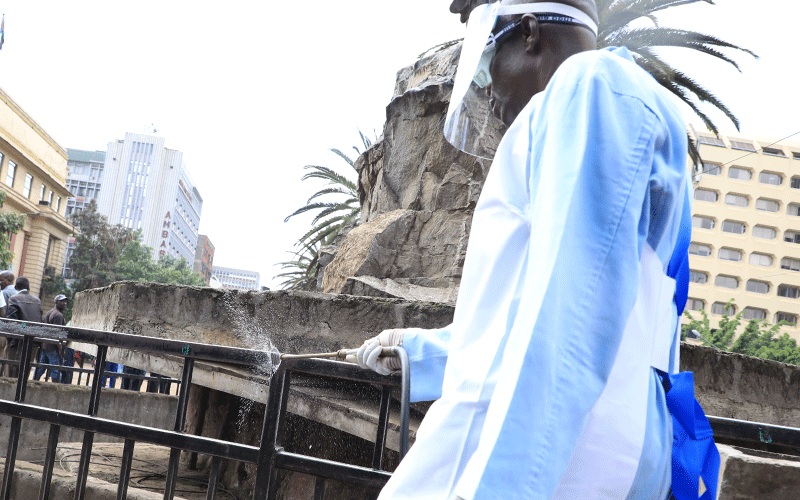Firms send staff home as virus ravages economy
By People Team, March 20, 2020Eric Wainaina, Harrison Kivisu and Felix Yegon
Workers are bearing the brunt of the coronavirus which has drastically impacted all sectors of the economy, with some employers sending their employees on unpaid leave while others are being urged to take a pay cut.
The hospitality industry, flower and horticulture farms and those dealing with export-oriented businesses are the worst hit following the banning of visitors from coronavirus-hit countries, most of which provide a market for local goods and products.
And yesterday, the Cabinet met and discussed strategies by the Treasury to realign the budgetary reallocations and other fiscal considerations to cushion the economy.
Kenya Hotel Keepers and Caterers Kenya Association executive director Sam Ikwaye said about 10,000 workers in the hospitality industry have been affected after businesses started trimming their staff.
“Everything is at standstill; business has come to a halt. We have no other option left than giving out letters to our staff to stay away until the situation is resolved. We have about 60 staff whom we have scaled down.
Hotels and restaurants have no alternative than laying off to survive,” said Ikwaye.
According to the Textile and Tailors Workers Union, a number of Export Processing Zones firms had laid off workers, including Africa Apparels EPZ (700), Simba Apparels EPZ in Changamwe (600), New Wide Garment (680), Bedi Investment (Nakuru) (360) and Alpha Knits in Ruiru (300).
Central Organisation of Trade Unions (Cotu) secretary general Francis Atwoli yesterday said most businesses were reducing their workforce because export of goods mostly to the European market had been affected and there were hardly any visitors flying in to sustain the hotel industry.
“The problem is that most of the countries which consume our goods like Italy and eastern Europe, people cannot consume our products because of the lockdown.
The hospitality sector is suffering because guests cannot come in,” he said. Retail and small businesses have also been affected by the economic slow down, forcing the owners to send some of their employees home temporarily or close business, leaving the workers without a source of livelihood.
Also affected are thousands of Kenyans who depend on daily wages by offering various services in various sectors of the economy.
Kenya Flower Council chief executive Clement Tulezi said most flower farms had terminated their engagements with thousands of casual workers while a large percent of the permanent employees have been sent on compulsory leave.
“We are in peak season but because of the virus, we are operating at 20 per cent.
We have been forced to send away all our seasonal employees who have been with us since December, and who were guaranteed a source of income until May.
If the situation remains the same, we might scale down on the number of permanent staff,” Tulezi told People Daily yesterday.
According to the official, their current major task is cutting and destroying ready flowers to maintain the cycle, an exercise which requires fewer people.
As the crisis unfolds, the Kenya Plantation and Agricultural Workers Union signed an agreement with the employers allowing the workers to go on a one month paid leave, pending a review depending on how the virus situation unfolds.
The Kenya National Chamber of Commerce president Richard Ngatia said the flower market in the Netherlands last week saw 20 per cent of the supply destroyed because there were no buyers and the forecast for the coming weeks is worse.
Keya is the lead exporter of roses to the European Union with a market share of about 38 per cent.
Approximately 50 per cent of Kenya’s exported flowers are sold through the Dutch Auction, and the situation has struck the sector hard.
“Companies need liquidity to make sure they survive this long pause of economic activity.
The coronavirus fallout is likely to be uneven, for instance, the producers of toilet paper don’t have a recession at all, and the restaurants and hotels have a very deep one,” Ngatia said yesterday as he called for government intervention.
Retained on half pay
Some of the big hotels in Nairobi have sent their workers on unpaid leave while others have slashed the pay by half, mainly because of cancellation of flights from Europe, Asia and America while many local people are avoiding the facilities.
Notable hotels where staff has been sent on leave include Mombasa Road-based Ole Sereni, Radisson Blu, Sankara, Serena and almost all lodges in the Maasai Mara, Amboseli and Tsavo.
The management in the establishments have indicated that the leave would be extended if the situation doesn’t improve.
Several hotels which still have some reserves, instead of declaring their employees redundant, the owners have retained staff on half pay, with promises to review the same when the situation improves.
Baobab Beach Resort in the North Coast is among the most hit and according to manager Clifford Adede, the establishment had sent 67 employees on unpaid leave.
Mombasa’s Sai Rock Beach hotel general manager Robert Kiiri said the hotel will start sending home some of its staff within a week as a cost cutting measure after an unprecedented cancellation of conferences.
